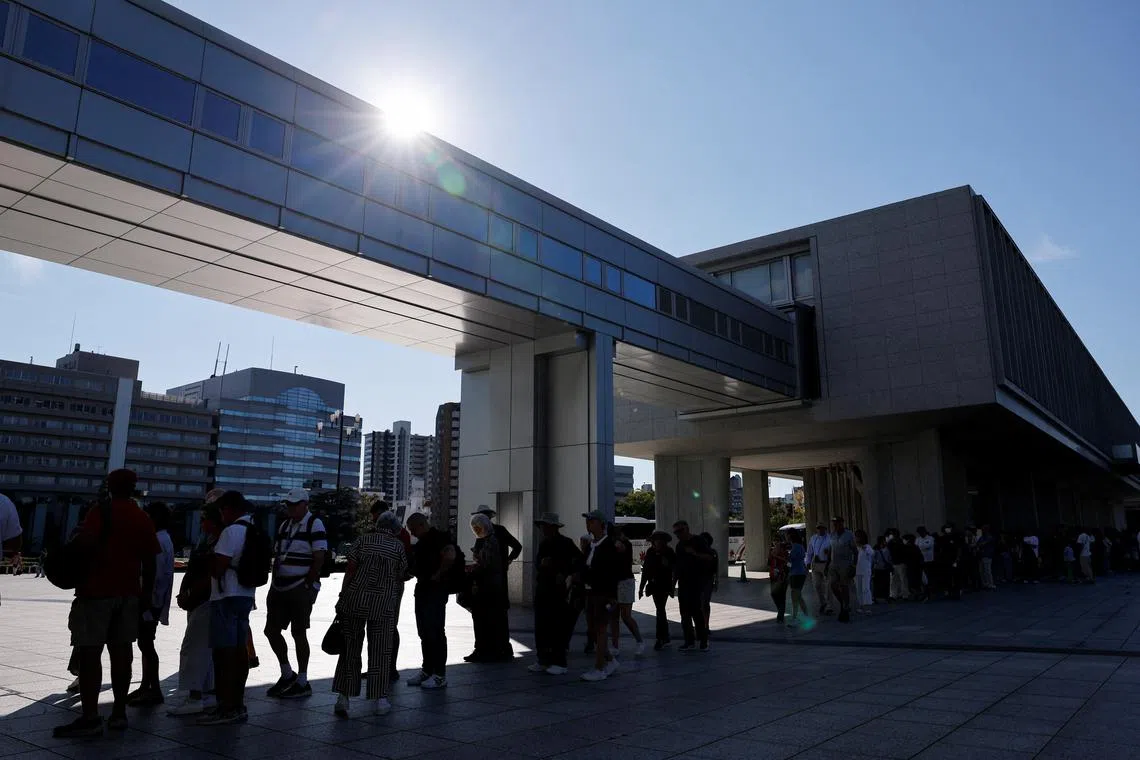In Hiroshima, Nobel Peace Prize brings survivors hope, sense of duty
Sign up now: Get insights on Asia's fast-moving developments

People queueing up to enter the Hiroshima Peace Memorial Museum on Oct 12.
PHOTO: REUTERS
HIROSHIMA, Japan – Almost eight decades after an atomic bomb devastated her home town of Hiroshima, Ms Teruko Yahata carries the scar on her forehead from when she was knocked over by the force of the blast.
The US bombs that laid waste to Hiroshima on the morning of Aug 6, 1945, and to Nagasaki three days later changed the course of history and left Ms Yahata and other survivors with deep scars and a sense of responsibility towards disarmament.
The awarding of the Nobel Peace Prize on Oct 11 to the Nihon Hidankyo group
“It felt as if a light suddenly shone through. I felt like I could see the light,” the 87-year-old said on Oct 12, describing her reaction to hearing about the award.
“This feels like the first step, the beginning of a movement towards nuclear abolition,” she told Reuters at the site of the Hiroshima Peace Memorial Museum.
She was just eight years old and in the back garden of her home when the bomb hit. Although her house was 2.5km from the hypocentre, the blast was strong enough to throw her several metres back into her house, she said.
Seventy-nine years later, and a day after the Norwegian Nobel Committee awarded the survivors the prize, a long line formed outside the museum, with dozens of foreign and Japanese visitors queueing up to get in.
A bridge leading into the memorial park was decorated with a yellow sheet and other handmade signs against nuclear weapons. Campaigners gathered signatures for nuclear abolition from those passing by.
Nihon Hidankyo, formed in 1956, has provided thousands of witness accounts, issued resolutions and public appeals, sent delegations to the UN and peace conferences, and collected signatures advocating nuclear disarmament.
Ms Yahata, who is not a Nihon Hidankyo member, said it was that drive to gather signatures that finally paid off after bearing little fruit for most of a century.
“It’s this amount of sadness and joy that led them to this peace prize. I think it’s something very meaningful,” she said.
Nihon Hidankyo’s co-chair, Mr Toshiyuki Mimaki, said he felt the award meant more responsibility, adding that most atomic bomb survivors were more than 85 years old.
“Rather than feeling purely happy, I feel like I have more responsibility now,” he told Reuters, sitting in a Hidankyo office in Hiroshima in front of a map showing the impact of the bomb on the city.
In rural areas, the group is on the verge of falling apart, the 82-year-old said. “The big challenge now is what to do going forward.” REUTERS


